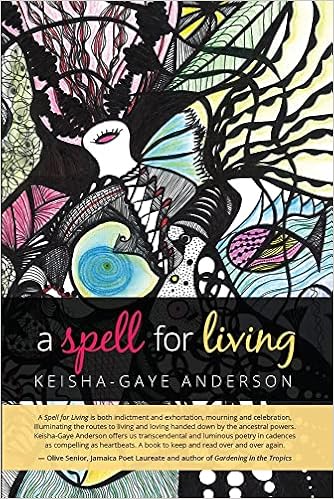 Reviewed by Elvis Alves
Reviewed by Elvis Alves
A Spell for Living
by Keisha-Gaye Anderson
June 2021, Paperback, 76 pages, ISBN-13: 978-1736465509
The writing in Keisha-Gaye Anderson’s A Spell For Living affirms life in that it encourages us to look within and beyond what is deemed reality in order to enjoy the present and take ownership of ourselves. The book is multifaceted in its construction. Its poetry is complemented by original artwork by the artist and contains voice recordings of Anderson reading her poetry (The ebook is free at keishagaye.ink and the audio poems are on SoundCloud). Spirituality is at the core of Anderson’s work. In it, she talks about God, the self, and the universe in one breath. These, and more, are attributes that shine light on spirituality but do not define it in totality. Anderson’s poetry leads to this point, that of knowing yet not knowing while searching for meaning.
The push to cross manufactured borderlines, physical, mental, and otherwise, is impressed upon in Anderson’s work. To do this, she employs poignant and open-ended questions, like those asked by the philosopher, religionist, or seeker of wisdom: “When cities are erected / everywhere / what of us will be left?” (“The Purge”) and “Why not move something? / Why not change the melody?” (“For Freddy Gray and All Those Murdered by State Violence”). Additionally, Anderson’s word choice draws you into her poetry, a light leading you in the dark. She wants you to question the validity of what you have been told and look beyond this—and beyond constructions of time, and even conception, to locate a secure sense of self. Here’s a stanza from “Fly”:
I want to fly
outside of predation
where time is a memory
and the fire
that moves these legs forward is itself
just for the sake of it
no longer needing to
push a horse
of bone and amnesia
The journey is encouraged and aided by a motherly figure that shows up in Anderson’s work. She is dreamlike and is associated with water. Water points to her power. Here are two stanzas from “We Talawah,” a term whose origin lies in Jamaican patois and means tall and strong, or having strength:
Meeting guardian
caciques in the land of Mami’s
sweet waterAnd she organize us all
by heart,
not by skin
Relationship with this figure and the divine that she represents is relationship with the self.
The title poem has a woman entering a church not for worship of any gods but of self. One can read this poem as a deconstructive critique of institutionalized religion but at its core is the celebration of what it means to be a true self that walks with confidence in the world:
…storm the church
and use the holy water
to douse your head
kick over the lectern
and slide between
the pews
write the names
of all your lovers…
The poem is not sacrilegious in that it is a celebration, a notice that can be buried in societies that prioritize wealth, fame, and other ephemeral goals above the recognition of a shared humanity. In the poem “Dis/Ease” while seeing a mentally ill homeless person, Anderson thinks of his mother:
someone pushed him
through her flesh
into the world
didn’t sit on his neck
loved him long enough
for him to not die
Anderson wonders what happened between birth and now to cause the man to be in the situation that he is currently in. We can assume societal, personal, and other forces as culprit. Anderson sees the man due to a watchfulness apparent in the construction of the poems in the collection.
The art of seeing is also evident in the artwork in the book. Anderson’s drawings have a colorful quality that draws you to them. They are done with colored pens and are untitled. Some contain circles that resemble eyes. These seem to say that they are watching you as much as you are watching them. Other drawings remind one of the insides of cells, think high school biology class. Is Anderson saying something about life here? The artwork’s beauty, and there are many aspects to this, is that the drawings allow you to make your own meaning while you are searching for meaning. This notion of agency is not removed from the poetry of the collection; indeed it is all a spiritual experience.
About the reviewer: Elvis Alves is the author of the poetry collections Ota Benga (Mahaicony Books, 2017), Bitter Melon (Mahaicony Books, 2013) and Blackfish (Salmon Poetry, 2022). Find out more at www.poemsbyelvis.blogspot.com or grab a copy of Blackfish here: https://www.salmonpoetry.com/details.php?ID=559&a=356